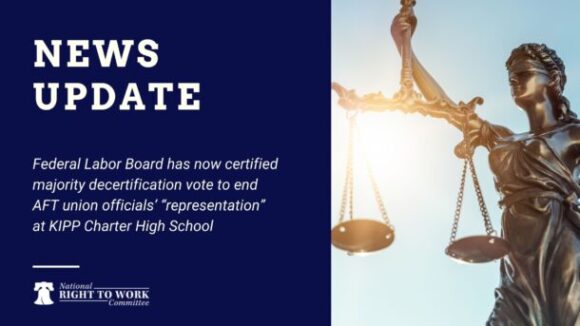Will Team Biden Weaponize Workers’ Pensions?
Big Labor abuse of worker pension and benefit funds as a means of advancing union bosses’ self-aggrandizing policy objectives is a familiar phenomenon.
Union officials, their spokespeople, and Big Labor’s ideological allies around the country are still venting their rage about the U.S. Supreme Court’s June 30 decision in Harris v. Quinn. In this case, argued in numerous written briefs and orally and ultimately won by National Right to Work Legal Defense Foundation attorneys, a 5-4 High Court majority found that, since eight Illinois home health care providers who were suing Big Labor Gov. Pat Quinn had not been hired by, are not supervised by, and cannot be fired by the state or any of its jurisdictions, they are not “full-fledged” public employees.
Consequently, the plaintiffs are not subject to the 1977 Abood decision or any other Supreme Court precedent upholding the constitutionality of forced union dues in the public sector. And that means the First Amendment prohibits Illinois politicians from requiring home caregivers to fork over money to a union in order to be compensated for their services with money indirectly derived from state Medicaid-waiver programs.
Detractors of Justice Sam Alito’s Harris majority opinion insist that, regardless of how little Service Employees International Union actually do, or are even legally empowered to do, for home caregivers, the latter should still be compelled to pay dues or fees, even if they want to have nothing to do with the union, because SEIU union bosses are supposedly responsible for a substantial rise in the state’s reimbursement rates for care providers since former Gov. Rod Blagojevich (now serving a lengthy federal prison service after being convicted on several corruption charges) unionized them by executive fiat in 2003.
In reality, evidence is lacking for the claim that SEIU bosses deserve the credit for the last decade’s worth of reimbursement rate increases. Rates were increasing rapidly, after all, during the 1980’s and 1990’s, when caregivers were not unionized. (Although percentage increases both before and after unionization have been substantial, reimbursement rates in absolute terms remain modest, because they started at a very low level, and many if not most caregivers are reimbursed only for some of the hours they work.)
SEIU propaganda, uncritically rehashed by pro-forced unionism Justice Elena Kagan (starting on page 40 in the link below), leaves out other key facts, including the most important of all: The higher “wages” (as Kagan labels them) for home caregivers for which union bosses purport to fight may, if achieved, leave patients with less money to cover other expenses they incur while being treated at home.
Right to Work Foundation attorney Bill Messenger, the counsel of record for the Harris plaintiffs, explained why this is so in a personal communication to me on June 9:
The majority of home care programs are Medicaid “waiver” programs, which means that the states have a lot of discretion in how to run those programs, but must receive a waiver from [the U.S. Department of Health & Human Services] to receive federal money. There are lots of strings attached. The amount of federal funding [and federal regulations] . . . strongly influence state payment rates to Medicaid providers.
The payment rate can affect the amount of money a patient has because most programs, including those in Illinois, have caps called “service cost maximums” on the total amount of money that a patient can receive in home care services in a given month. So, if a patient has to devote more of [his or her] total allotment to pay for personal assistance due to an increase in reimbursement rates, that could leave . . . less money for other home services (or will result in fewer personal assistance hours).
It hardly seems necessary to explain why a caregiver looking after a family member, a dear friend, or an ordinary client of modest means who requires a great deal of medical attention would not want a “wage increase” that comes at the patient’s expense. But apparently this is something that all four of the dissenting justices, as well as many of the pro-forced unionism commentators who have denounce the Harris decision since it was issued, have trouble understanding!


Big Labor abuse of worker pension and benefit funds as a means of advancing union bosses’ self-aggrandizing policy objectives is a familiar phenomenon.

What impact does handing a union monopoly power to deal with your employer on matters concerning your pay, benefits, and work rules have on your pay?

Federal Labor Board has now certified majority decertification vote to end AFT union officials’ “representation” at KIPP Charter High School